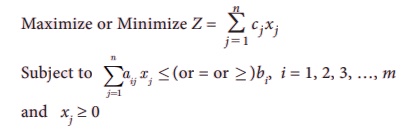Maths - Summary of Operations Research | 11th Business Mathematics and Statistics(EMS) : Chapter 10 : Operations Research
Chapter: 11th Business Mathematics and Statistics(EMS) : Chapter 10 : Operations Research
Summary of Operations Research
Summary
Linear programming problem(LPP)
is a mathematical modeling technique which is used to allocate limited available
resources in order to optimize (maximize or minimize) the objective function.
Short
form of LPP

Objective
function: A function Z = c1x 1 +c2x2
+…. +cnxn which is to be optimized (maximized or
minimized) is called objective function.
Decision
variable: The decision variables are the variables we seek to determine to
optimize the objective function. xj , j = 1,2,3,…,n , are the
decision variables.
Solution: A set of
values of decision variables xj,j =1,2,3,…,n satisfying all the constraints
of the problem is called a solution to that problem.
Feasible
solution: A set of values of the decision variables that satisfies all the
constraints of the problem and non-negativity restrictions is called a feasible
solution of the problem.
Optimal
solution: Any feasible solution which maximizes or minimizes the objective
function is called an optimal solution.
Feasible
region: The common region determined by all the constraints including
non-negative constraints xj≥0 of a linear programming problem is
called the feasible region ( or solution region) for the problem.
Linear programming problems which
involve only two variables can be solved by graphical method.
It should be noted that the
optimal value of LPP occurs at the corner points of the feasible region
Network is a diagrammatic
representation of various activities concerning a project arranged in a logical
manner.
An activity is a task or item of
work to be done, that consumes time, effort, money or other resources
The beginning and end points of
an activity are called events (or nodes).
Critical path: The longest path connected by the activities in the network is called the critical path. A path along which it takes the longest duration.
Related Topics